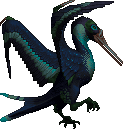Viewing fPQNE

Father: Unknown
Unknown Pedigree
Hardiness: 77
Appearance: 4
Emerged: 12:11 28.06.2020
Matured: 20:55 30.06.2020
Muskbirdos feed on fish and small amphibians that they hunt by air. They use their long bill and articulated claws to capture prey, and their heavily oiled feathers help them dry off easily after a quick dive. Food is presented to potential mates as a demonstration of the male’s hunting prowess. Interested females will dance in response. Although Muskbirdos can be found nesting anywhere near lakes and rivers, they prefer the isolated, protected habitat of small offshore islands. Their nests are simple, rounded mounds of mud mixed with grass. Females tend to the eggs and then the chicks, while the male hunts. Though their colors and patterns vary, adults retain the iridescent feathers displayed in juveniles, with the iridescence near the throat expanding down over the chest as the Muskbirdo ages.
The creatures that dwell in this rather desolate world still display some diversity in appearance, eating habits, and social behavior. Whether they have fur or feathers, skin or scales, their unique genetic makeup allows for a variety of colors and markings within each species. Despite limitations in food sources, herbivores, omnivores, and carnivores are all present in the food chain, and each species requires specialized care within a laboratory. Although the artificial setting of housing units and breeding pods precludes most opportunities to study true interspecific behavior, the interactions within and between species has been studied extensively in the wilderness by scientists daring enough to venture beyond the outpost’s walls.
